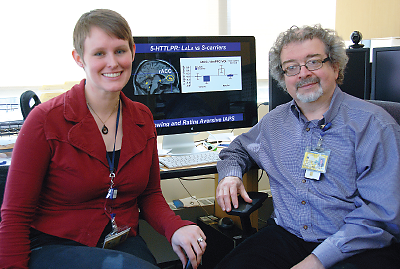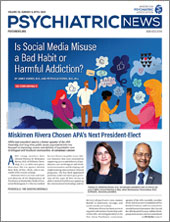Neurotransmitters Studied as Way to Enhance PTSD Treatment
Abstract
More than one neurotransmitter may open the path to improving exposure-based therapies for anxiety disorders.
For years, researchers have sought ways to enhance the fear extinction learning that lies at the heart of exposure-based therapies. Those approaches are considered the best-proven treatments for anxiety disorders, yet all too often they fall short.
“Both fear and fear extinction are critical mechanisms for survival,” said Israel Liberzon, M.D, a professor of psychiatry, psychology, and neuroscience at the University of Michigan. “Normally, people learn which places are safe and which are dangerous, but we see deficits in how PTSD patients learn or unlearn to be fearful.”
Several neurotransmitter systems are being explored in an effort to treat posttraumatic stress disorder (PTSD) and other anxiety disorders by enhancing either extinction learning or the retention of the extinguished memory.
For instance, both D-cycloserine, which affects the glutaminergic system, and yohimbine, an alpha2-receptor antagonist, have been investigated as adjuncts to exposure-based therapy.

Cannabinoid modulators may augment extinction learning in exposure-based therapy and prevent the return of fear memories in people with anxiety disorder, according to Christine Rabinak, Ph.D., and Israel Liberzon, M.D.
The more of these pathways scientists study, the better the understanding of both mechanisms and avenues to treatments will be, said Liberzon and research fellow Christine Rabinak, Ph.D. They spoke recently with Psychiatric News in Liberzon’s Ann Arbor office about the biochemical pathway they currently study, the cannabinoid system.
Cannabinoid receptors are present in areas of the brain important for emotional learning and memory, such as the ventromedial prefrontal cortex and the hippocampus. They are trying to get at the mechanics of learning to see if an exogenous cannabinoid like Δ9-tetrahydrocannabinol (THC) can make memories stronger or longer lasting.
“Our work is driven by the discovery that endocannabinoids are existing modulators in regular memory processes,” said Liberzon.
Work on cannabinoids is relatively new, Rabinak noted. The first paper studying how cannabinoid receptors in knockout rat models affect fear learning appeared in Nature only in 2002.
Now, the work of Rabinak, Liberzon, and others has expanded cannabinoid research from rodents into human subjects.
In a paper published in Neuropharmacology in January, they and several colleagues reported results of a study in which they gave 14 healthy volunteers oral THC prior to extinction learning and compared them with 15 others who received a placebo.
They saw no effects of the THC on behavioral responses of either group during extinction learning. However, the next day, when the drug was no longer present in the system, they found that the subjects who were exposed to the THC had better recall of extinction memory than did those who received placebo.
In short, said Liberzon, “the effects of the THC are not happening under the influence of THC.”
“We speculate that the THC is doing something in the brain to change areas that are activating or interacting after learning—but exactly what is still unknown,” explained Rabinak. The changes caused by THC are not necessarily occurring in the learning process itself, but perhaps in the later consolidation phase.
No single one of these adjunctive compounds is likely to be the ultimate answer for improving exposure-based therapy, they said. Cannabinoids are simply another piece of a bigger puzzle.
“Learning is governed and modulated by several systems,” said Liberzon. “Perhaps different people could be more sensitive to different substances. But each one might modulate a specific component of cognition, and that’s how we should be working, on targeted interventions that don’t have so much global effect.” ■
An abstract of “Cannabinoid Facilitation of Fear Extinction Memory Recall in Humans” is posted at http://www.sciencedirect.com/science/article/pii/S0028390812003371.



